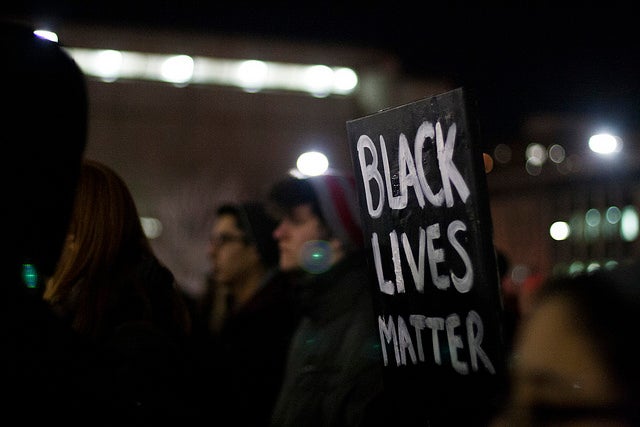As the New Year dawns, the nation’s streets remain alive with protest. The Black Lives Matter movement, headed by a new generation of leaders, continues to draw attention to the aggressive policing of black people that has led to numerous deadly encounters. New York City police officers have repeatedly turned their backs on the mayor as a symbolic gesture of displeasure with his criticism of the department. Still other crowds of Americans are speaking out against the focus on blacks by proclaiming that all lives matter.
The racial stratification of these different marches is the visual companion to the racial polarization evinced in national public opinion polls. The headlines would have us believe the nation is at a precipice of racial animus. Conversely, President Obama recently said that in most Americans’ day-to-day interactions, the nation is actually less racially divided. No matter the varying views, here is what is certain: the race question is before the nation once again and clamoring anew to be addressed.
Before America can tackle this latest manifestation of its race issues, there needs to be reconciliation. It is vital that the country baselines the current debate with a national recommitment to the American promise of liberty and justice for all.
There is no better opportunity to begin the work of reconciliation than on February 1, 2015 – the 150th anniversary of President Abraham Lincoln’s signing of the 13th Amendment abolishing slavery.
Lincoln’s signature on the congressional ratification of the 13th Amendment was not necessary for the measure to move forward, but he signed it anyway. He did so to mark for posterity his allegiance to the idea that our founding principles cannot coexist with race-based abridgments of liberty. His signature was an act of bravery and moral courage – a principled result after considering other unethical solutions.
The nation should hold a ceremony commemorating the sesquicentennial of the 13th Amendment as a tribute to our highest ideals, the best of the American character, and the liberty and equal treatment we hold sacrosanct in our society. Through this gesture, we renew our claim on the declaration of the equality of all men and women, rededicate ourselves to this goal, and apply this vision to the race debate.
It is a truism that race conversations often are fraught with pitfalls. Discussions of structural discrimination can turn into personal accusations. Race remains such an emotional third-rail that even well-meaning, honest conversations can quickly devolve into destructive dialogues in which assigning blame is the primary objective.
There is no doubt our nation has fallen short of its promise throughout history. Many have suffered at the hands of the state: enslaved blacks, forcibly removed Native Americans, immigrants and indentured servants, Japanese-Americans in internment camps, and the many Americans pushed into poverty because they were deemed unworthy of opportunity, just to name a few. Though these horrors are not equal in their severity or duration, the common thread is that citizens’ liberties were unduly and unfairly infringed upon by the state.
Efforts at racial reconciliation too often result in the pitting of citizens against one another instead of coming to terms with the role of the state. Because liberty is a contract between state and citizen, persistent infringements on liberty are inherently state-sanctioned. Fortunately, whenever the state has levied unjustified deprivations of liberty on some of its population, it was the citizen that forced a change in course. Our liberty is not a gift, but a hard-earned right through the people’s blood and sweat.
A commemoration of Lincoln’s signing of the 13th Amendment is a renewal of the state-citizen contract that guarantees liberty and justice will continue to be a national preoccupation. As such, it necessarily must be a formal state act, one that seeks to reconcile past deprivations of liberty, which is most pronounced in America’s historic approach to race.
This ritual of ceremony would honor the immutable American soul that embodies different people united in a belief in the American idea. Most importantly, a commemoration of the 13th Amendment will force the nation to pause and remember a critical moment in our history when the state, its leaders, and its people were in consensus that abridging liberty because of race was fundamentally un-American. The debates on race we are having today provide solid proof that this reminder is sorely needed.
When Lincoln endorsed the 13th Amendment, he proclaimed aloud, “This finishes the job.” He and the Americans of his era finished the job before them to end slavery. But they did not solve the race question; this is a task for every generation. Today, our job is before us. Our duty is not a matter of public policy, but of further crystallizing our national identity. If we do not seize this moment – if we miss this critical juncture to come together – we will only pass on to posterity our failure to live up to our creed. This cannot be.
Our brave response to this question of morality and national identity begins with racial reconciliation, and a February 1st ceremonial commemoration of the 13th Amendment – one of our nation’s finest hours – is the perfect place to start.


